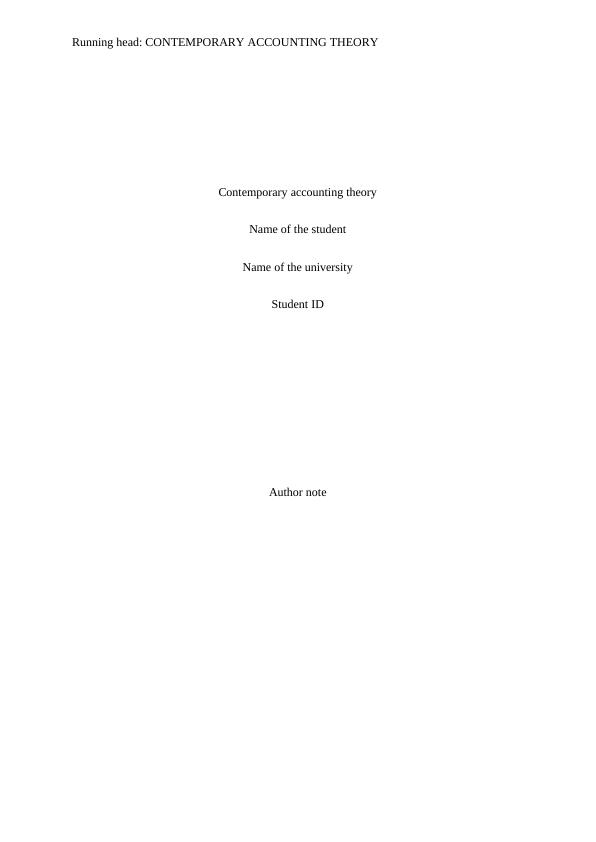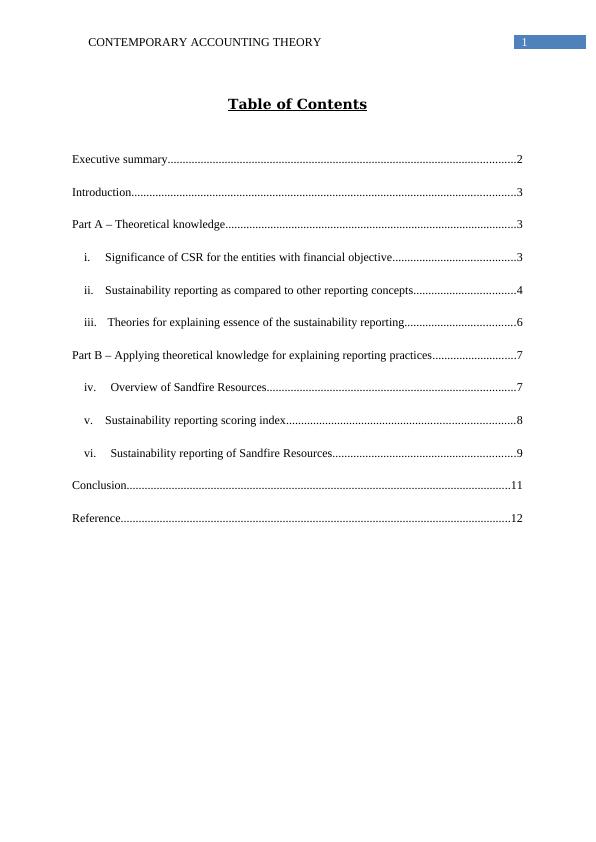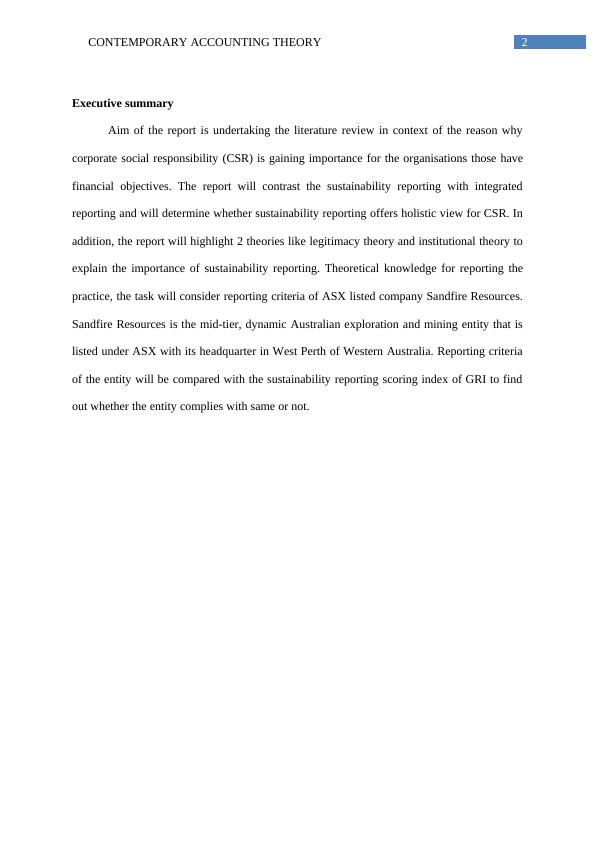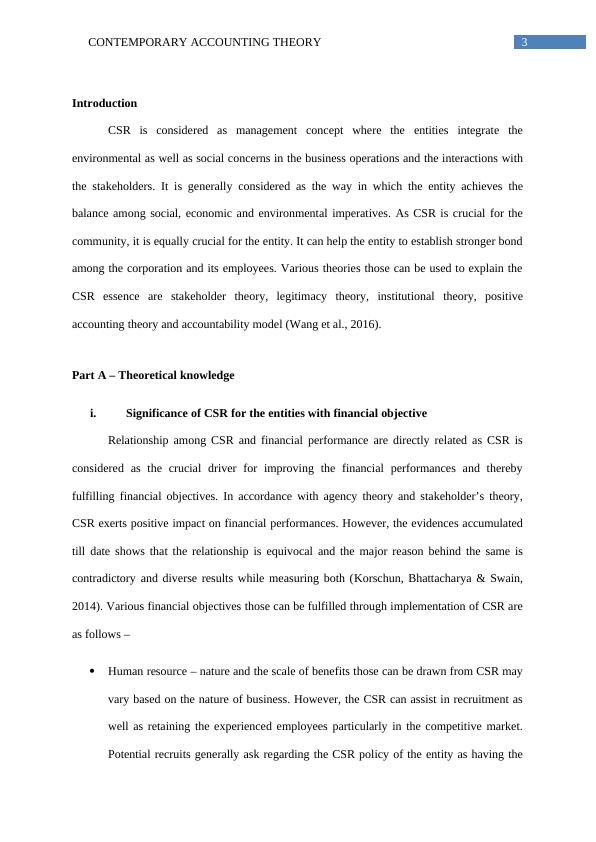Introduction to ConTEMPORARY ACCOUNTING THEORY 11 CONTEMPORARY ACCOUNTING THEORY
Added on 2022-10-17
16 Pages3488 Words391 Views
Running head: CONTEMPORARY ACCOUNTING THEORY
Contemporary accounting theory
Name of the student
Name of the university
Student ID
Author note
Contemporary accounting theory
Name of the student
Name of the university
Student ID
Author note

1CONTEMPORARY ACCOUNTING THEORY
Table of Contents
Executive summary....................................................................................................................2
Introduction................................................................................................................................3
Part A – Theoretical knowledge.................................................................................................3
i. Significance of CSR for the entities with financial objective.........................................3
ii. Sustainability reporting as compared to other reporting concepts..................................4
iii. Theories for explaining essence of the sustainability reporting.....................................6
Part B – Applying theoretical knowledge for explaining reporting practices............................7
iv. Overview of Sandfire Resources...................................................................................7
v. Sustainability reporting scoring index............................................................................8
vi. Sustainability reporting of Sandfire Resources.............................................................9
Conclusion................................................................................................................................11
Reference..................................................................................................................................12
Table of Contents
Executive summary....................................................................................................................2
Introduction................................................................................................................................3
Part A – Theoretical knowledge.................................................................................................3
i. Significance of CSR for the entities with financial objective.........................................3
ii. Sustainability reporting as compared to other reporting concepts..................................4
iii. Theories for explaining essence of the sustainability reporting.....................................6
Part B – Applying theoretical knowledge for explaining reporting practices............................7
iv. Overview of Sandfire Resources...................................................................................7
v. Sustainability reporting scoring index............................................................................8
vi. Sustainability reporting of Sandfire Resources.............................................................9
Conclusion................................................................................................................................11
Reference..................................................................................................................................12

2CONTEMPORARY ACCOUNTING THEORY
Executive summary
Aim of the report is undertaking the literature review in context of the reason why
corporate social responsibility (CSR) is gaining importance for the organisations those have
financial objectives. The report will contrast the sustainability reporting with integrated
reporting and will determine whether sustainability reporting offers holistic view for CSR. In
addition, the report will highlight 2 theories like legitimacy theory and institutional theory to
explain the importance of sustainability reporting. Theoretical knowledge for reporting the
practice, the task will consider reporting criteria of ASX listed company Sandfire Resources.
Sandfire Resources is the mid-tier, dynamic Australian exploration and mining entity that is
listed under ASX with its headquarter in West Perth of Western Australia. Reporting criteria
of the entity will be compared with the sustainability reporting scoring index of GRI to find
out whether the entity complies with same or not.
Executive summary
Aim of the report is undertaking the literature review in context of the reason why
corporate social responsibility (CSR) is gaining importance for the organisations those have
financial objectives. The report will contrast the sustainability reporting with integrated
reporting and will determine whether sustainability reporting offers holistic view for CSR. In
addition, the report will highlight 2 theories like legitimacy theory and institutional theory to
explain the importance of sustainability reporting. Theoretical knowledge for reporting the
practice, the task will consider reporting criteria of ASX listed company Sandfire Resources.
Sandfire Resources is the mid-tier, dynamic Australian exploration and mining entity that is
listed under ASX with its headquarter in West Perth of Western Australia. Reporting criteria
of the entity will be compared with the sustainability reporting scoring index of GRI to find
out whether the entity complies with same or not.

3CONTEMPORARY ACCOUNTING THEORY
Introduction
CSR is considered as management concept where the entities integrate the
environmental as well as social concerns in the business operations and the interactions with
the stakeholders. It is generally considered as the way in which the entity achieves the
balance among social, economic and environmental imperatives. As CSR is crucial for the
community, it is equally crucial for the entity. It can help the entity to establish stronger bond
among the corporation and its employees. Various theories those can be used to explain the
CSR essence are stakeholder theory, legitimacy theory, institutional theory, positive
accounting theory and accountability model (Wang et al., 2016).
Part A – Theoretical knowledge
i. Significance of CSR for the entities with financial objective
Relationship among CSR and financial performance are directly related as CSR is
considered as the crucial driver for improving the financial performances and thereby
fulfilling financial objectives. In accordance with agency theory and stakeholder’s theory,
CSR exerts positive impact on financial performances. However, the evidences accumulated
till date shows that the relationship is equivocal and the major reason behind the same is
contradictory and diverse results while measuring both (Korschun, Bhattacharya & Swain,
2014). Various financial objectives those can be fulfilled through implementation of CSR are
as follows –
Human resource – nature and the scale of benefits those can be drawn from CSR may
vary based on the nature of business. However, the CSR can assist in recruitment as
well as retaining the experienced employees particularly in the competitive market.
Potential recruits generally ask regarding the CSR policy of the entity as having the
Introduction
CSR is considered as management concept where the entities integrate the
environmental as well as social concerns in the business operations and the interactions with
the stakeholders. It is generally considered as the way in which the entity achieves the
balance among social, economic and environmental imperatives. As CSR is crucial for the
community, it is equally crucial for the entity. It can help the entity to establish stronger bond
among the corporation and its employees. Various theories those can be used to explain the
CSR essence are stakeholder theory, legitimacy theory, institutional theory, positive
accounting theory and accountability model (Wang et al., 2016).
Part A – Theoretical knowledge
i. Significance of CSR for the entities with financial objective
Relationship among CSR and financial performance are directly related as CSR is
considered as the crucial driver for improving the financial performances and thereby
fulfilling financial objectives. In accordance with agency theory and stakeholder’s theory,
CSR exerts positive impact on financial performances. However, the evidences accumulated
till date shows that the relationship is equivocal and the major reason behind the same is
contradictory and diverse results while measuring both (Korschun, Bhattacharya & Swain,
2014). Various financial objectives those can be fulfilled through implementation of CSR are
as follows –
Human resource – nature and the scale of benefits those can be drawn from CSR may
vary based on the nature of business. However, the CSR can assist in recruitment as
well as retaining the experienced employees particularly in the competitive market.
Potential recruits generally ask regarding the CSR policy of the entity as having the

End of preview
Want to access all the pages? Upload your documents or become a member.
Related Documents
Contemporary Accounting Theory Report 2022lg...
|17
|4663
|31
Assignment (Doc) | Contemporary Accounting Theorylg...
|19
|4598
|16
Corporate Social Responsibility and Sustainability Reporting: A Case Study of ASX: QUBlg...
|16
|4263
|316
Contemporary Accounting Theory Research Paper 2022lg...
|17
|3881
|15
Importance of Corporate Social Responsibility and Sustainability Reporting in Contemporary Accountinglg...
|17
|4638
|1
Report Contemporary Accounting Theory 2022lg...
|21
|4641
|27
